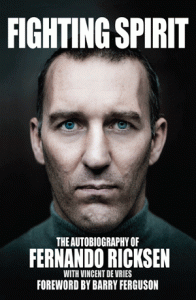Book Review: Fighting Spirit – The autobiography of Fernando Ricksen with Vincent de Vries
 From the cover of this book out stares Ricksen. It is a face known to the fans of Fortuna Sittard, AZ Alkmaar, Glasgow Rangers, Zenit St. Petersburg and the Dutch national side. It is a face that since late 2013 has started to shows sign of the terminal illness that is motor neurone disease (MND). This killer disease has started to attack his body so that his movement is increasingly affected as is his speech and his face now has a haunted, gaunt look.
From the cover of this book out stares Ricksen. It is a face known to the fans of Fortuna Sittard, AZ Alkmaar, Glasgow Rangers, Zenit St. Petersburg and the Dutch national side. It is a face that since late 2013 has started to shows sign of the terminal illness that is motor neurone disease (MND). This killer disease has started to attack his body so that his movement is increasingly affected as is his speech and his face now has a haunted, gaunt look.
But it was not always thus. Throughout his career Ricksen had a reputation for playing hard on the pitch and partying even harder off it. If you look on You Tube you’ll find examples of the Dutchman on the one hand scoring some superb free-kicks, whilst on the other dishing out some reckless tackles. The record books show he played twelve times for the Netherlands and won league titles in his homeland, Scotland and Russia, as well as a UEFA Cup winner’s medal. Ricksen had talent, but his career was dogged with controversy; Fighting Spirit tells this story.
The nineteen chapters follow Ricksen’s early life growing up in Limburg, and his career via Alkmaar, Glasgow and St. Petersburg, to his retirement from football in 2012/13 and a brief epilogue in which he touches on his battle with MND. The book content is as you would expect dominated by the stories that made the headlines on the front and back pages of newspapers wherever Ricksen played. These cover the training ground bust-ups, the red cards, the rows with teammates and managers alike, the drink, drugs, infidelity and the lavish lifestyle. And whilst these are entertaining to a point, there is very little depth to the book. Unfortunately, anything of a serious nature, such as Ricksen’s dealing with his drinking and drugs problem is pretty much skirted over, and as a further example, his views on gay footballers are dealt with in a single paragraph.
In terms of the tone of the book it is unashamedly ‘bloke-ish’, with a conversational style but which lapses on occasions into a stream of consciousness which is not always easy to follow. There are also a number of asides to the reader, which whilst trying to maintain a matey connection, just feel slightly contrived. However, there are moments when you sense you get a glimpse of the man under the madness of the past, a man capable of reflection; the pity is that this insight comes in the final two pages of the book:
I am the only one to blame. I messed things up so much. It was me and only me! I am not proud of it…I sincerely regret parts of it. I have hurt people – loads of them…I’m not pleased with a lot of things that happened.